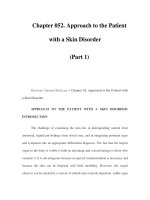Chapter 052. Approach to the Patient with a Skin Disorder (Part 7) ppt
Bạn đang xem bản rút gọn của tài liệu. Xem và tải ngay bản đầy đủ của tài liệu tại đây (13.68 KB, 5 trang )
Chapter 052. Approach to the Patient
with a Skin Disorder
(Part 7)
Allergic contact dermatitis (ACD).
A. An example of ACD in its acute phase, with sharply demarcated,
weeping, eczematous plaques in a perioral distribution. B. ACD in its chronic
phase demonstrating an erythematous, lichenified, weeping plaque on skin
chronically exposed to nickel in a metal snap. (B, Courtesy of Robert Swerlick,
MD; with permission.)
As in other branches of medicine, a complete history should be obtained to
emphasize the following features:
1. Evolution of lesions
a. Site of onset
b. Manner in which the eruption progressed or spread
c. Duration
d. Periods of resolution or improvement in chronic eruptions
2. Symptoms associated with the eruption
a. Itching, burning, pain, numbness
b. What, if anything, has relieved symptoms
c. Time of day when symptoms are most severe
3. Current or recent medications (prescribed as well as over-the-
counter)
4. Associated systemic symptoms (e.g., malaise, fever, arthralgias)
5. Ongoing or previous illnesses
6. History of allergies
7. Presence of photosensitivity
8. Review of systems
9. Family history (particularly relevant for patients with melanoma,
atopy, psoriasis, or acne)
10. Social, sexual, or travel history as relevant to the patient
DIAGNOSTIC TECHNIQUES
Many skin diseases can be diagnosed on gross clinical appearance, but
sometimes relatively simple diagnostic procedures can yield valuable information.
In most instances, they can be performed at the bedside with a minimum of
equipment.
Skin Biopsy
A skin biopsy is a straightforward minor surgical procedure; however, it is
important to biopsy a lesion that is most likely to yield diagnostic findings. This
decision may require expertise in skin diseases and knowledge of superficial
anatomic structures in selected areas of the body. In this procedure, a small area of
skin is anesthetized with 1% lidocaine with or without epinephrine. The skin
lesion in question can be excised or saucerized with a scalpel or removed by
punch biopsy. In the latter technique, a punch is pressed against the surface of the
skin and rotated with downward pressure until it penetrates to the subcutaneous
tissue. The circular biopsy is then lifted with forceps, and the bottom is cut with
iris scissors. Biopsy sites may or may not need suture closure, depending on size
and location.
KOH Preparation
A potassium hydroxide (KOH) preparation is performed on scaling skin
lesions where a fungal infection is suspected. The edge of such a lesion is scraped
gently with a no. 15 scalpel blade, and the removed scale is collected on a glass
microscope slide then treated with 1 to 2 drops of a solution of 10–20% KOH.
KOH dissolves keratin and allows easier visualization of fungal elements. Brief
heating of the slide accelerates dissolution of keratin. When the preparation is
viewed under the microscope, the refractile hyphae will be seen more easily when
the light intensity is reduced and the condenser is lowered. This technique can be
utilized to identify hyphae in dermatophyte infections, pseudohyphae and budding
yeast in Candida infections (see Fig. 196-1), and "spaghetti and meatballs" yeast
forms in tinea versicolor. The same sampling technique can be used to obtain scale
for culture of selected pathogenic organisms.









